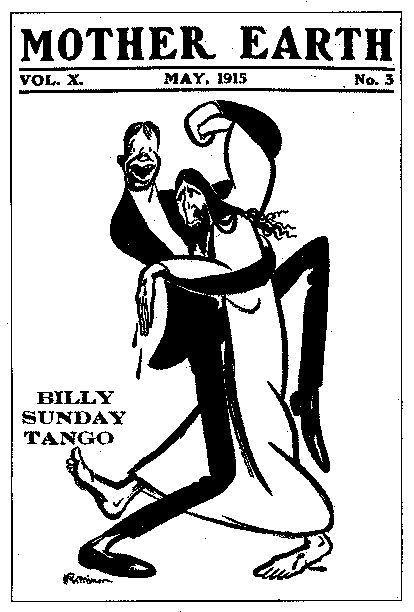The Heartland
Billy Sunday and
The Transformation of
American Society,
1862 - 1935
Robert F. Martin
(Indiana University)

charged back and forth on the platform, dropped to his knees at times, flopped into a chair, jumped upon it, waved his handkerchief and shook his fists, shouted, laughed, stormed, sweated and performed a variety of other feats which would put an ordinary man in bed for a week.
His organizers reported that,
One of these sermons ... had one ten-minute period in it where from two to twelve men fainted and had to be carried out every time I heard him preach it.
His attitude toward the Devil's Brew --- and those who produced it --- was no less militant. He said that brewers and distillers were "the most damnable, corrupt institution that ever wriggled out of hell and fastened itself on the public." The saloon
came as near being a rat hole for wage earners to dump his wages in as anything you can find.
He may have preached family values, but his own family was a wreck. His sons' conduct, reports Martin, "made a mockery of the version of the gospel to which their father had committed his life ... They found themselves entangled in a web of divorce, remarriage, allegations of immorality, litigation, and debt." One son, George, committed suicide in 1932.
Sunday's great success was tied to the material progress of the forty years of his ministry and the ideal of the "Middle West" which "epitomized traditional, wholesome, vibrant, prosperous, democratic American civilization," according to the author. It all began to fall apart with the changes in social restraints after WWI. The evangelist's star faded so that by the time of his death in 1935, "both Billy Sunday and the Middle West seemed to millions increasingly quaint, ludicrous, or irrelevant."
Although the writing style is plodding, sometimes creaky, Hero of the Heartland makes for moderately interesting reading because Sunday was such a fascinating character. However the author, a history professor by trade, is so intent on making his didactic points (such as trying to analyse Sunday, and his "psychological problems") that he fails to give us a sense of the power and fire that made the preacher so popular. The book would have benefited from extensive excerpts from his sermons and fewer lectures on the socio-economic factors that built his career and "the mystique of the Middle West."
From those few bits of his sermons included here, it is easy to see that Sunday's power lay in the old rhetorical devices of repetition, rhythm and poetry. His Saloon Speech, for example, is a fascinating study in the use of the English language for didactic purposes:
The only interest it pays is red eyes and foul breath, and the loss of health. You go in with money and you come out with empty pockets. You go in with character and you come out ruined. You go in with a good position and you lost it ... It pays nothing back but disease and damnation and gives an extra dividend in delirium tremens and a free pass to hell. And then it will let your wife be buried in the potter's field and your children go to the asylum.
"You go in .. and you come out... You go in ... and you come out ... You go in and ... you lost it." Then: "What does it give you? Disease Damnation (an extra) Dividend (in) Delirium (tremens) and [note the Miltonian rhythms here] "a free pass to hell." Finally there's this unabashedly dramatic poetic conclusion: your wife goes to "the potter's field," your children go to "the asylum."